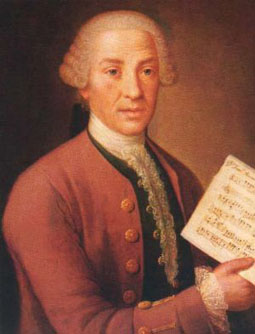| Francesco Durante  Born: 15-Mar-1684 Born: 15-Mar-1684
Birthplace: Frattamaggiore, Italy
Died: 13-Aug-1755
Location of death: Naples, Italy
Cause of death: unspecified
Remains: Buried, Church of San Lorenzo Maggiore, Naples, Italy
Gender: Male
Religion: Roman Catholic
Race or Ethnicity: White
Sexual orientation: Straight
Occupation: Composer Nationality: Italy
Executive summary: Pastoral Mass Italian composer, was born at Frattamaggiore, in the kingdom of Naples, on the 15th of March 1684. At an early age he entered the Conservatorio dei poveri di Gesů Cristo, at Naples, where he received lessons from Gaetano Greco, later he became a pupil of Alessandro Scarlatti at the Conservatorio di Sant' Onofrio. He is also supposed to have studied under Pasquini and Pitoni in Rome, but no documentary proof of this statement can be given. He is said to have succeeded Scarlatti in 1725 at Sant' Onofrio, and to have remained there until 1742, when he succeeded Porpora as head of the Conservatorio di Santa Maria di Loreto, also at Naples. This post he held for thirteen years, until his death on the 13th of August 1755 at Naples. He was married three times. His fame as a teacher was all but unrivalled, and Jommelli, Paisiello, Pergolesi, Piccini and Vinci were amongst his pupils. A complete collection of Durante's works, consisting all but exclusively of sacred compositions, was presented by Selvaggi, a Neapolitan lover of art, to the Paris library. A catalogue of it may be found in Fétis's Biographie universelle. The imperial library of Vienna also preserves a valuable collection of Durante's manuscripts. Two requiems, several masses (one of which, a most original work, is the Pastoral Mass for four voices) and the Lamentations of the prophet Jeremiah are amongst his most important settings. The fact that Durante never composed for the stage brought him a somewhat exaggerated reputation as a composer of sacred music. Although certainly one of the best church composers of his style and period, he is far inferior to Leo, and seems to have been the founder of the sentimental school of Italian church music. Leo and Scarlatti at their best have a solidity and dignity entirely wanting in Durante, and Alessandro Scarlatti at his worst is frivolous rather than sentimental. This type of music is characteristic of Durante as a man; intellectually uncultured, but sincerely devout. As a teacher he insisted on the strict observance of rules for which he either would not or could not give a reason, differing thus from Alessandro Scarlatti, whose first care was to develop his pupils' talents according to their own individualities, regarding all rules as subservient to his exquisite sense of musical beauty. Hasse rightly protested against Durante's being described as the greatest harmonist of italy, a title which could be claimed only by Alessandro Scarlatti.
Do you know something we don't?
Submit a correction or make a comment about this profile
Copyright ©2019 Soylent Communications
|